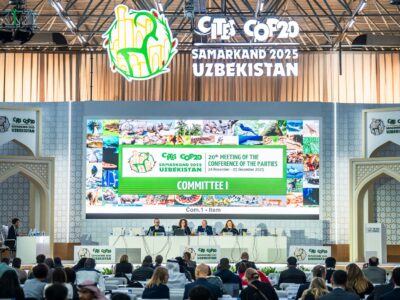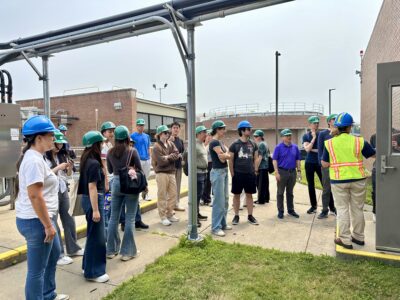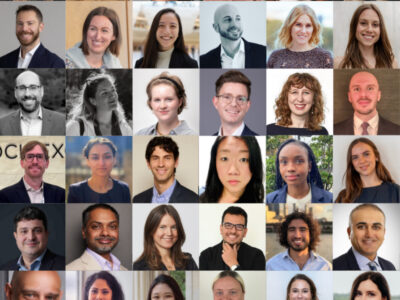Growing up in Santiago, Chile, Clarisa Marambio watched her two older sisters actively engage in conservation and biodiversity efforts when she was still a kid. Even then, she found herself inspired by what she saw.

Now, Marambio has followed in the family footsteps as a student in Columbia University’s M.P.A. in Environmental Science and Policy (ESP) program at the School of International and Public Affairs (SIPA), graduating this May.
In the Q&A below, Marambio discusses her environmental policy interests, how she tailored her coursework to focus on Latin America and her most memorable experiences in the program.
What do you think is the greatest sustainability challenge?
There are numerous sustainability challenges, and one that I follow closely is the Global Plastic Treaty—an extremely complex negotiation process that some will describe as the most significant environmental agreement since the 2015 Paris Agreement. The global plastic (and microplastic) crisis demands international action. These negotiations started in late 2022 and are supposed to conclude by the close of 2024.
Sadly, there has been a rise in concerns within past negotiations, including the overrepresentation of industry representatives compared to delegates from the 70 smallest U.N. member states; the fragmentation of global efforts; and the lack of U.S. commitment to curbing plastic production and prioritizing short-term consensus over long-term sustainable solutions.
Another pressing concern for me is lithium extraction in my region. This decade is pivotal for power sector decarbonization, and Latin America’s production will determine the pace of the transition. It will be a huge challenge to safeguard our region’s environment by avoiding disproportionate benefits on one piece of the globe/country/population by exploiting the resources of another. This is why the geopolitical aspect is crucial, necessitating reliable partnerships while safeguarding profitability diversification.
What is your background and what brought you to environmental topics?
I’m from Santiago, Chile, a city with a unique geography that faces different environmental issues, such as air pollution. In fact, Santiago ranks as one of the most polluted cities. Also, living in a country that has historically relied on mining as a primary economic driver—contributing, for example, to 30% of the world’s copper—has shaped my perspective on our natural ecosystems, their exploitation and the sustainable practices that could be implemented. My passion for environmental issues also grew because of my two older sisters, Camila and Alejandra.
As an undergrad, I studied journalism and social communication, and during that time, I mostly conducted my research on water rights and mining policies. In addition to studying, I worked at a communication agency, while also supporting my sisters in the media outreach and press releases of their projects. This experience led me to my last full-time job as a sustainability and climate change consultant at Deloitte before entering the ESP program.
What made you choose ESP?
While working as a consultant at Deloitte with major companies in mining, forestry, aquaculture, energy and transport, I got to know the Chilean policies and international standards governing these industries really well. However, I felt a need for additional technical skills related to the scientific aspects of environmental issues.
So far, the program has given me the opportunity to deepen my understanding not only of environmental science but also of public administration.
What are some highlights of your experience with the program?
Meeting incredible people from all over the world has been a major highlight. There have been close friendships made here that I know I’ll keep for the rest of my life! Also, there is a genuine passion my cohort shares for environmental issues, and collaborating with them has truly been the cornerstone of my experience.
Another big highlight has been working in the Center on Global Energy Policy with Luisa Palacios, a Venezuelan professor with a career in energy, finance and policy. We’ve been analyzing mining in Latin America, its geopolitical influences and ESG practices.
The number of things you can accomplish while here is amazing. Whether it’s organizing events, panels or discussions, the ESP program, SIPA and the Climate School encourage and facilitate it all.
I’m also part of the student government of SIPA as my program’s representative, which has allowed me to support further issues and concerns.
Do you have any favorite courses so far?
The first semester brought a wave of environmental courses that correlated perfectly, creating an enjoyable learning experience. I had so much fun while diving into risk assessment and toxicology and environmental chemistry topics that we discussed in class. I’m also taking a course called “Storytelling and the Art of Creating Social Impact Campaigns” with Stephen Friedman that has been incredible. The way he teaches and the content has enlightened me in so many different ways. I’m immensely happy I took this class.
Last but not least, the experience of getting used to seeing former Secretary Hillary Clinton in the “Inside the Situation Room” course every Wednesday is still surreal.
What will you take with you after the program?
The fact that I can call my classmates and friends from all over the world—Shubhi (India) for insights on energy ideas, Belén (Perú) for guidance on impact measurement, Yazan (Saudi) for advice on renewables, Jeremy (Seychelles) and Saia (US) for insights on COP and world treaties, Mina (UK) and Fritz (Germany) for creative problem-solving, Aurélie (Israel) for opinions on water resilience, Isi (Chile) for economic policy perspective and Cate (Italy) for any advice gives me confidence for whatever path I take. This support network is truly invaluable in achieving any goal. And the list could go on and on.
Any advice for someone looking to apply to this program?
Do it! While going through the program, one aspect that has given me satisfaction is consistently working on assignments, memos and essays using my specific interests—Chilean or Latin American cases and examples. This approach has allowed me to directly apply acquired skills and knowledge, making all of this experience even more meaningful. You can incorporate your own specific interests.



